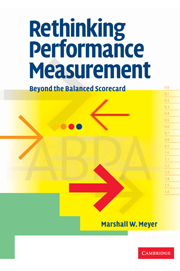Introduction
Published online by Cambridge University Press: 14 May 2010
Summary
Dissatisfaction with performance measurement systems runs high. Many firms, perhaps the majority, suspect that they haven't got it right. A 1995 article in Chief Financial Officer begins, “According to a recent survey, 80 percent of large American companies want to change their performance measurement systems …” Unsurprisingly, the turmoil in performance measurement is ongoing. Startup companies struggling for capital must continually adjust their metrics. And it is commonplace for large firms to undertake annual overhauls of their performance measurement systems.
Why the turmoil and dissatisfaction? One cause is the ongoing search for non-financial predictors of financial performance: “Yesterday's accounting results say nothing about the factors that actually help grow market share and profits – things like customer service innovation, R&D effectiveness, the percent of first-time quality, and employee development.” Another cause, ironically, is a surfeit of measures: many corporate controllers cite the burdens imposed by “newfangled performance measures” as a key source of burnout. Anecdotal reports such as these suggest that executives are seeking measures that controllers and chief financial officers have so far been reluctant or unable to deliver. The result is frustration on both sides.
Whether the problem is too few or too many measures, many accountants believe that corporate performance measurement systems do not support management objectives well. According to the Institute of Management Accountants, the proportion of accountants rating their performance measures as “poor” or “less than adequate,” the bottom two categories on a six-point scale where the fourth category is “adequate,” has remained substantial, ranging from 35 percent in 1992 to 43 percent in 1993, 38 percent in 1995, 43 percent in 1996, 34 percent in 1997, 40 percent in 2000, and 33 percent in 2001.
- Type
- Chapter
- Information
- Rethinking Performance MeasurementBeyond the Balanced Scorecard, pp. 1 - 18Publisher: Cambridge University PressPrint publication year: 2003



